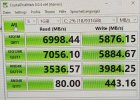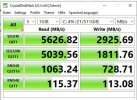Hallo zusammen,
ich bin Proxmox-Neuling, habe es aber dank diverser (YouTube-)Tutorials geschafft, das System erfolgreich auf einem NUC 12 zu installieren. Direkt im Anschluss habe ich eine VM mit Windows Server 2022 aufgesetzt, das ging auch ohne Probleme. Was mir allerdings aufgefallen ist, sind die "schlechten" IO-Werte meiner SSD im Vergleich zu einer Bare-Metal-Installation von Windows Server.
Die VM liegt auf einer NVMe-SSD, die Lese- und Schreibraten von bis zu 7.300 MB/s erreichen kann - und dies ohne Proxmox auch annähernd tut. In der VM spuckt mir CrystalDiskMark jedoch deutlich schlechtere Werte aus, vor allem beim Schreiben.
Benchmark Bare Metal:

Benchmark Proxmox-VM:

Ich nutze ZFS mit allen Tweaks, die ich so finden konnte (zpool set autotrim=on, zfs set xattr=sa, zfs set atime=off, zfs set sync=disabled), VirtIO als SCSI-Controller sowie VirtIO Block als Bus für die Disk; Cache ist aus. Eine testweise erstellte zweite VM mit SCSI als Block brachte keine Verbesserung.
Ist das normal und ich muss damit leben? Ich wusste natürlich vorher, dass ich bei ZFS zugunsten anderer Features auf Performance verzichte, aber das ist mir dann doch ein bisschen arg. Gibt es noch Stellschrauben, an denen ich drehen kann?
Hier noch meine Pool-Konfiguration. Auf rpool ist bloß Proxmox installiert, die VMs laufen auf dem Pool vms.
Ich danke im Voraus für etwaige Tipps.
ich bin Proxmox-Neuling, habe es aber dank diverser (YouTube-)Tutorials geschafft, das System erfolgreich auf einem NUC 12 zu installieren. Direkt im Anschluss habe ich eine VM mit Windows Server 2022 aufgesetzt, das ging auch ohne Probleme. Was mir allerdings aufgefallen ist, sind die "schlechten" IO-Werte meiner SSD im Vergleich zu einer Bare-Metal-Installation von Windows Server.
Die VM liegt auf einer NVMe-SSD, die Lese- und Schreibraten von bis zu 7.300 MB/s erreichen kann - und dies ohne Proxmox auch annähernd tut. In der VM spuckt mir CrystalDiskMark jedoch deutlich schlechtere Werte aus, vor allem beim Schreiben.
Benchmark Bare Metal:

Benchmark Proxmox-VM:

Ich nutze ZFS mit allen Tweaks, die ich so finden konnte (zpool set autotrim=on, zfs set xattr=sa, zfs set atime=off, zfs set sync=disabled), VirtIO als SCSI-Controller sowie VirtIO Block als Bus für die Disk; Cache ist aus. Eine testweise erstellte zweite VM mit SCSI als Block brachte keine Verbesserung.
Ist das normal und ich muss damit leben? Ich wusste natürlich vorher, dass ich bei ZFS zugunsten anderer Features auf Performance verzichte, aber das ist mir dann doch ein bisschen arg. Gibt es noch Stellschrauben, an denen ich drehen kann?
Hier noch meine Pool-Konfiguration. Auf rpool ist bloß Proxmox installiert, die VMs laufen auf dem Pool vms.
Bash:
root@proxmox:~# zpool get all
NAME PROPERTY VALUE SOURCE
rpool size 888G -
rpool capacity 0% -
rpool altroot - default
rpool health ONLINE -
rpool guid 15498355550547173204 -
rpool version - default
rpool bootfs rpool/ROOT/pve-1 local
rpool delegation on default
rpool autoreplace off default
rpool cachefile - default
rpool failmode wait default
rpool listsnapshots off default
rpool autoexpand off default
rpool dedupratio 1.00x -
rpool free 882G -
rpool allocated 6.35G -
rpool readonly off -
rpool ashift 12 local
rpool comment - default
rpool expandsize - -
rpool freeing 0 -
rpool fragmentation 0% -
rpool leaked 0 -
rpool multihost off default
rpool checkpoint - -
rpool load_guid 12062635733350499484 -
rpool autotrim on local
rpool compatibility off default
rpool feature@async_destroy enabled local
rpool feature@empty_bpobj active local
rpool feature@lz4_compress active local
rpool feature@multi_vdev_crash_dump enabled local
rpool feature@spacemap_histogram active local
rpool feature@enabled_txg active local
rpool feature@hole_birth active local
rpool feature@extensible_dataset active local
rpool feature@embedded_data active local
rpool feature@bookmarks enabled local
rpool feature@filesystem_limits enabled local
rpool feature@large_blocks enabled local
rpool feature@large_dnode enabled local
rpool feature@sha512 enabled local
rpool feature@skein enabled local
rpool feature@edonr enabled local
rpool feature@userobj_accounting active local
rpool feature@encryption enabled local
rpool feature@project_quota active local
rpool feature@device_removal enabled local
rpool feature@obsolete_counts enabled local
rpool feature@zpool_checkpoint enabled local
rpool feature@spacemap_v2 active local
rpool feature@allocation_classes enabled local
rpool feature@resilver_defer enabled local
rpool feature@bookmark_v2 enabled local
rpool feature@redaction_bookmarks enabled local
rpool feature@redacted_datasets enabled local
rpool feature@bookmark_written enabled local
rpool feature@log_spacemap active local
rpool feature@livelist enabled local
rpool feature@device_rebuild enabled local
rpool feature@zstd_compress enabled local
rpool feature@draid enabled local
vms size 928G -
vms capacity 3% -
vms altroot - default
vms health ONLINE -
vms guid 3312461236419923309 -
vms version - default
vms bootfs - default
vms delegation on default
vms autoreplace off default
vms cachefile - default
vms failmode wait default
vms listsnapshots off default
vms autoexpand off default
vms dedupratio 1.00x -
vms free 897G -
vms allocated 31.0G -
vms readonly off -
vms ashift 12 local
vms comment - default
vms expandsize - -
vms freeing 0 -
vms fragmentation 0% -
vms leaked 0 -
vms multihost off default
vms checkpoint - -
vms load_guid 2685839280608218036 -
vms autotrim on local
vms compatibility off default
vms feature@async_destroy enabled local
vms feature@empty_bpobj active local
vms feature@lz4_compress active local
vms feature@multi_vdev_crash_dump enabled local
vms feature@spacemap_histogram active local
vms feature@enabled_txg active local
vms feature@hole_birth active local
vms feature@extensible_dataset active local
vms feature@embedded_data active local
vms feature@bookmarks enabled local
vms feature@filesystem_limits enabled local
vms feature@large_blocks enabled local
vms feature@large_dnode enabled local
vms feature@sha512 enabled local
vms feature@skein enabled local
vms feature@edonr enabled local
vms feature@userobj_accounting active local
vms feature@encryption enabled local
vms feature@project_quota active local
vms feature@device_removal enabled local
vms feature@obsolete_counts enabled local
vms feature@zpool_checkpoint enabled local
vms feature@spacemap_v2 active local
vms feature@allocation_classes enabled local
vms feature@resilver_defer enabled local
vms feature@bookmark_v2 enabled local
vms feature@redaction_bookmarks enabled local
vms feature@redacted_datasets enabled local
vms feature@bookmark_written enabled local
vms feature@log_spacemap active local
vms feature@livelist enabled local
vms feature@device_rebuild enabled local
vms feature@zstd_compress active local
vms feature@draid enabled localIch danke im Voraus für etwaige Tipps.
Last edited:

